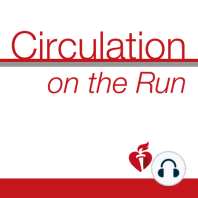16 min listen
Circulation January 5, 2021 Issue
ratings:
Length:
30 minutes
Released:
Dec 30, 2020
Format:
Podcast episode
Description
New in 2021, we will feature 2 Feature Discussions every other week. For this week, we start with author Michael Gold and editorialist Sana Al-Khatib as they discuss the article "Primary Results from the Understanding Outcomes with the S-ICD in Primary Prevention Patients with Low Ejection Fraction (UNTOUCHED) Trial." Then, we switch to an important discussion about children and COVID-19 as author Israel Valverde and Associate Editor Gerald Greil discuss "Acute Cardiovascular Manifestations in 286 Children with Multisystem Inflammatory Syndrome Associated with COVID-19 Infection in Europe." TRANSCRIPT BELOW: Dr. Carolyn Lam: Welcome to Circulation on the Run. Your weekly podcast summary and backstage pass to the journal and its editors. We're your co-hosts. I'm Dr. Carolyn Lam, associate editor from the National Heart Center and Duke National University of Singapore. Greg Hundley: And I'm Greg Hundley, director of the Pauley Heart Center at VCU Health in Richmond, Virginia. Well, Carolyn, we have two features in this issue. Dr. Carolyn Lam: I know. Greg Hundley: Yeah. And I've got the first one. It's going to be evaluating the acute cardiovascular manifestations in 286 children with multi-system inflammatory syndrome. Dr. Carolyn Lam: Wow. That is so important in the current pandemic. Well, the other is also so important. It's really, really critical results from the subcutaneous ICD trial called UNTOUCHED. I think that one might change clinical practice. So, do you want to tell us about other papers first? Greg Hundley: Yes. Carolyn, I'm going to grab my cup of coffee and we'll get started and my first paper comes from China. Professor Junbo Ge. So Carolyn PCSK9, mainly secreted by the liver and released into the blood elevates plasma load density lipoprotein cholesterol by degrading LDL receptors. Pleiotropic effects of PCSK9 beyond lipid metabolism have been shown. However, the direct effects of PCSK9 on platelet activation and thrombosis, as well as the underlying mechanisms still remain unclear. Greg Hundley: So this group detected the direct effects of PCSK9 on agonist-induced platelet aggregation, dense granule ATP release, integrin a2b beta-3 activation, alpha granule release, spreading and clot retraction. They also investigated the underlying mechanisms. Using myocardial infarct models, they explored the effects of PCSK9 on microvascular obstruction and infarct expansion, post myocardial infarction. Dr. Carolyn Lam: Oh, nice. And what did they find? Greg Hundley: Well, Carolyn, PCSK9 in plasma directly enhances platelet activation and in vivo thrombosis, as well as myocardial infarct expansion post MI by binding to platelet CD36 and thus activating the downstream signaling pathways. PCSK9 inhibitors, or aspirin, abolished the enhancing effects of PCSK9 supporting the use of aspirin in patients with high plasma PCSK9 levels in addition to PCSK9 inhibitors to prevent thrombotic complications. Dr. Carolyn Lam: Wow. Very interesting. Indeed, the pleiotropic effects. Well guess what? My paper talks about the first non-LDL lowering treatment that has been shown to reduce CABG in a blinded randomized trial. Greg, can you guess what that treatment was? Well, here's a hint, here's a hint. It's the REDUCE-IT trial. Greg Hundley: Well, Carolyn, thanks for the hint. It must be icosapent ethyl. Dr. Carolyn Lam: Indeed, indeed. As a reminder, REDUCE-IT was a multicenter double-blind placebo controlled trial, which randomized statin treated patients with elevated triglycerides, controlled LDL and either established cardiovascular disease or diabetes plus other risk factors to receive icosapent ethyl at four grams daily or placebo. The primary and secondary composite end points were significantly reduced. The current paper examined all coronary revascularizations, recurrent revascularizations and revascularization subtypes. First revascularizations were reduced by icosapent ethyl versus placebo with a hazard ratio of 0.66, which is
Released:
Dec 30, 2020
Format:
Podcast episode
Titles in the series (100)
Circulation August 30, 2016 Issue: Circulation Weekly: Your Weekly Summary & Backstage Pass To The Journal by Circulation on the Run
